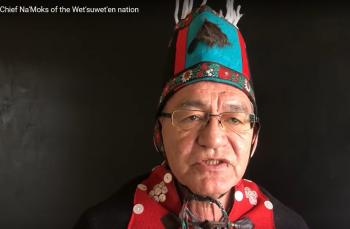Image Caption
Summary
Local Journalism Initiative Reporter
Windspeaker.com
Amnesty International Canada has condemned the Canadian and British Columbian governments in their dealings with Wet’suwet’en land defenders over the construction of the Coastal GasLink (CGL) pipeline and are calling for an immediate end to that construction.
The organization also alleges human right violations and is calling for the RCMP and private security forces to leave the Wet’suwet’en territory and for the violations to be dealt with.
Amnesty’s report, Criminalization, Intimidation and Harassment of Wet’suwet’en Land Defenders, was released yesterday, which also marked the 26th anniversary of the Supreme Court of Canada’s Delgamuukw-Gisday’wa decision. That decision affirmed Wet’suwet’en law, which set the Wet’suwet’en hereditary chiefs as the ancestral authorities of the Wet’suwet’en Nation.
CGL pipeline will transport natural gas extracted from the Dawson Creek area to a liquified natural gas export facility near Kitimat, B.C. The 670-kilometre-long pipeline will divide Wet’suwet’en territory into two. Hereditary chiefs have opposed the construction of the line, while many elected chiefs with communities along the line have signed benefit agreements.
Amnesty’s report studied and condemned the actions of the two levels of government along with CGL (and other owners of the pipeline), the RCMP, and CGL’s private security firm Forsythe Security, stressing that the Wet’suwet’en had never sold, surrendered or relinquished their collective title to their territories.
The report outlines what Amnesty considers the failure of the governments’ consultation process, the abuse of tactics by the RCMP and Forsythe Security, and the misuse of judicial and prosecutorial powers.
“Our research findings…reveal that Wet’suwet’en Nation continues to suffer severe violations of its internationally recognized rights. The right to self-government, the right to free, prior and informed consent, and the right to make decisions related to its territory and its resources,” said Ketty Nivyabandi with Amnesty International Canada (English-speaking section).
“Canada is failing to fulfill its duty to protect human rights by allowing CGL pipeline to proceed even though the project is resulting in multiple violations of the Wet’suwet’en Nation’s human rights,” said France-Isabelle Langlois with Amnistie internationale Canada francophone.
Wet’suweten Hereditary Chief Na’Moks (John Ridsdale), sitting beside Amnesty representatives, called the report “the truth.”
“When you stand up and tell the truth you can be challenged at many, many levels. Look what they’ve done to us. They criminalize us and remove us from our land,” said Na’Moks.
The report examines what Amnesty considers human rights violations, which occurred from January 2019 to March 2023. In that time, the RCMP undertook large-scale police operations equipped with semi-automatic weapons, helicopters and dog units. More than 75 land defenders were arrested and detained, with 20 prosecuted for criminal contempt.
Also during this time, Wet’suwet’en land defenders were subjected to “intrusive and aggressive surveillance, harassment and intimidation” by both the RCMP and Forsythe Security, says the report. There were “random” police stops of vehicles and, in dealings with both RCMP and security officers, “racist overtones.”
This action, says Amnesty, is part of an effort by the government to remove Wet’suwet’en land defenders from their ancestral territory in order to allow pipeline construction to proceed.
“These actions have also resulted, and continue to result, in ongoing violations of the human rights of Wet’suwet’en land defenders and their supporters, including the right to life, liberty, security of the person, privacy, family life, non-discrimination, culture and their collective rights as Indigenous Peoples,” says the report.
The B.C. Superiour Court issued an injunction preventing anyone from interfering with CGL’s work. The injunction is still in place and authorizes the RCMP to make arrests.
The injunction, says the report, is “overbroad” and allows CGL to continue with construction “without the Wet’suwet’en Nation’s free, prior and informed consent, constituting an ongoing infringement of its rights to self-governance.”
Sleydo’ (Molly Wickham) said government action was leading to a “police state.”
“It’s a clear indication that the government and industry and the police are going to use every tactic possible at their disposal to prevent us in continuing to uphold our rights, continuing to uphold our laws, stopping us from being who we are as Indigenous people,” said Sleydo’, who appeared virtually.
This treatment, said Wet’suwet’en Hereditary Chief Woos (Frank Alec), has resulted in trauma at the hands of “the oppressors…and the enforcers.”
“To this date the trauma…that has impacted the families of the supporters, the land defenders, the Wet’suwet’en people, Wet’suwet’en land defenders, Indigenous land defenders, our brothers and sisters…(of) other nations there to support us, their trauma has yet to be addressed. Instead, they were put to court, put through more trauma,” said Woos, who also appeared virtually.
Amnesty says it also experienced being watched and followed by the RCMP and Forsythe Security in the three visits its members made to Wet’suwet’en territory in 2022 and earlier this year to gather information.
Na’Moks said the report “has weight.”
“It actually gives us confidence that Canada and its government will do what it’s supposed to do: Represent the people, not industry and direct all entities of government to follow suit,” he said.
Nivyabandi said the governments and other subjects in the report had been provided with the “right of reply.” However, their responses, she said, did not address in full the recommendations that Amnesty had made.
The report can be read here: https://www.amnesty.org/en/documents/amr20/7132/2023/en/

